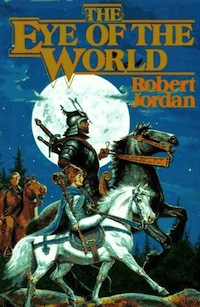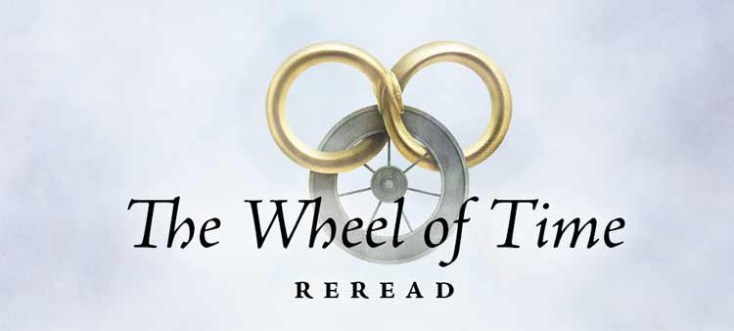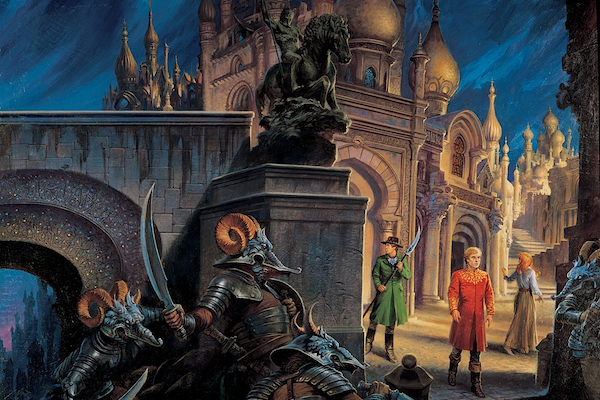Wheel of Time Reread Redux! Whoo! Yeah! Whoo! Yeah!
Today’s Redux post will cover Chapters 22 and 23 of The Eye of the World, originally reread in this post.
All original posts are listed in The Wheel of Time Reread Index here, and all Redux posts will also be archived there as well. (The Wheel of Time Master Index, as always, is here, which has links to news, reviews, interviews, and all manner of information about the Wheel of Time in general on Tor.com.)
The Wheel of Time reread is also now available as an ebook series, except for the portion covering A Memory of Light, which should become available soon.
All Reread Redux posts will contain spoilers for the entire Wheel of Time series, so if you haven’t read, read at your own risk.
And now, the post!
Once more, Note of Scheduling: Holidays are a thing, and therefore so are hiatuses! As previously mentioned, I plan to have a post for next week (December 23rd), and the blog will then be on hiatus for the next two weeks, resuming January 13th.
Onward!
 Chapter 22: A Path Chosen
Chapter 22: A Path Chosen
Redux Commentary
This chapter is possibly the shortest summary/commentary I ever did for the entire original Reread, which is hilarious to me for some reason. I’m perversely impressed by the summary in particular; who knew I could even be that brief?
But then, I was completely right that there was (and is) very little worth actually commenting on in this chapter, and in fact was probably only broken off from the following chapter to keep the latter from getting overly long.
The only thing that jumped out at me at all was this:
Everything for making a fire was gone with his saddlebags, but the cedar trees would yield tinder and a firebow with a bit of work.
Mostly because it reminded me of my earlier conviction that I would so never survive a survival situation. In my yoot, I was in the Girl Scouts (no, really), and I remember they taught us once how to start a fire with a bow drill, and so theoretically I know how to make one, but (a) this was like a thousand years ago, and (b) the adults really did most of the work anyway, so let’s just say I am highly skeptical of my ability to reproduce the lesson in practice. So given that, I will again celebrate my current and hopefully ongoing status of not being stranded in medieval-ish forest lands! Go me!
And… yeah. So short commentary remains short(ish), apparently. Yay!
 Chapter 23: Wolfbrother
Chapter 23: Wolfbrother
Redux Commentary
“This is an old thing, boy. Older than Aes Sedai. Older than anybody using the One Power. Old as humankind. Old as wolves.”
The weirdly either/or depiction of wolves in fantasy stories has always been rather fascinating to me. I mentioned in the original commentary that I had recently read A Companion to Wolves by Sarah Monette and Elizabeth Bear, which was true, and while I was mostly making a joke there (which will only make sense if you’ve actually read that book, which I recommend you do), that novel is just one of a very large spread of fantasy stories that have examined the roles of wolves in speculative fiction, and come to vastly different interpretations of it.
There seems to be (to me, anyway) a fairly sharp dichotomy in the way wolves are depicted in fantasy: either they are representative of all that is evil/bad/dangerous to humanity (e.g., classic fairy tales, the majority of Disney films, C.S. Lewis’s Narnia books, most pre-urban fantasy-era werewolves), or they are regarded as formidable and noble (if still fundamentally savage) allies of humanity, as in most urban fantasy works, David Eddings’ Belgarion books, George RR Martin’s A Song of Ice and Fire series, and of course WOT itself. Some, like the Harry Potter series, ride the line between wolves being good or bad (though Remus Lupin’s “goodness” is mostly about fighting against his wolfy nature, werewolves are still equated in the books with Rowling’s condemnation of the wizarding world’s prejudice against marginalized groups, and thus inherently implied to be more “good” than they are otherwise), but generally speaking wolves are either a good thing or a bad thing in speculative fiction, with no margin in between.
I read something once (unfortunately I can’t remember where) about why that dichotomy exists, not only in fiction but in real life, and the author’s theory was that it has to do with the eerie similarity that wolves bear to primitive human beings. Like us, they are apex predators, who coordinate and cooperate in groups to bring down prey whom they would otherwise never be able to handle; like us, they form close-knit families/packs who support and, to all appearances, love one another, in startling contrast to their frightening efficiency as hunters. But that similarity, which ought to make them endearing to us (and it does, sometimes) also means they are a threat to us. And in a way, equating them with humanity makes that threat worse.
Because after all, no one knows better than humans what absolute assholes humans can be. And so if wolves are like us in those other ways, what’s to say they aren’t like us in the asshole-y ways as well?
In a weird fashion, I think that wolves fall into the Uncanny Valley of human perception (though obviously not in the general sense that term is used), which is to say that the closer they are to being like us, the scarier and more off-putting they can be perceived to be. So just as there is an often distinct polarity between the way people are depicted (depending on whether you think Hobbes Was Right or Rousseau was—don’t click those links if you want to get anything done today), there is a corresponding divergence between how wolves are represented as well.
The difference, of course, is that the traditional depiction of wolves as being evil has a long and deeply unfortunate impact on actual wolves. And while I can’t honestly claim that my initial delight in WOT’s embrace of wolves as a force for good was originally influenced by that knowledge, it certainly is now.
Maybe it’s sappy or whatever, but as a general rule I have always infinitely preferred the stories that treated wolves as good (or at least neutral) entities to the ones that used them as convenient villains and/or henchmen to Evil™. Maybe because anything that can inspire that level of uneasiness and, yes, fear in human beings is probably something worthy of respect at the very least. Because we are arrogant bastards who at least metaphorically need to be taken down a peg or two, dontcha know.
Plus, you know. As I said originally, talking to wolves? SUPER COOL. Even if (as I also said) I can’t logically blame Perrin for being super freaked out about it.
(I might possibly be okay with blaming him for taking approximately thirteen books to get over his freaked-outedness, though. Sheesh.)
“Every wolf remembers the history of all wolves, or at least the shape of it. Like I said, it can’t be put into words very well. They remember running down prey side-by-side with men, but it was so long ago that it’s more like the shadow of a shadow than a memory.”
“That’s very interesting,” Egwene said, and Elyas looked at her sharply. “No, I mean it. It is.” She wet her lips. “Could… ah… could you teach us to talk to them?”
AHAHAHA. Oh, Egwene. Always the Ooh Ooh Girl. No matter what the hell it is, she wants to learn about it. *is fond*
Lastly, I know it’s an entirely minor point, but I’m mildly disappointed that we never meet up with Burn again. Presumably he died when he went off to fight Trollocs alone and that’s why we never come across him again, but it would have been kind of nicely bookend-y for him to have shown up for Perrin’s giant wolf army party at the end of the series, and acknowledge that he was wrong about him all that time ago.
But, well. It’s pretty unimportant in the grand scheme of things. Especially since Hopper is introduced here in the very first scene of Perrin + wolves, and that’s a thing that goes on till very nearly the end. (Sigh, sniffle.)
And that’s the show for now, kiddies! Try not to panic about all the Christmas/Hanukkah/Winter Solstice/office party/whatever gifts you probably still have to buy, and I’ll see you next Tuesday!












